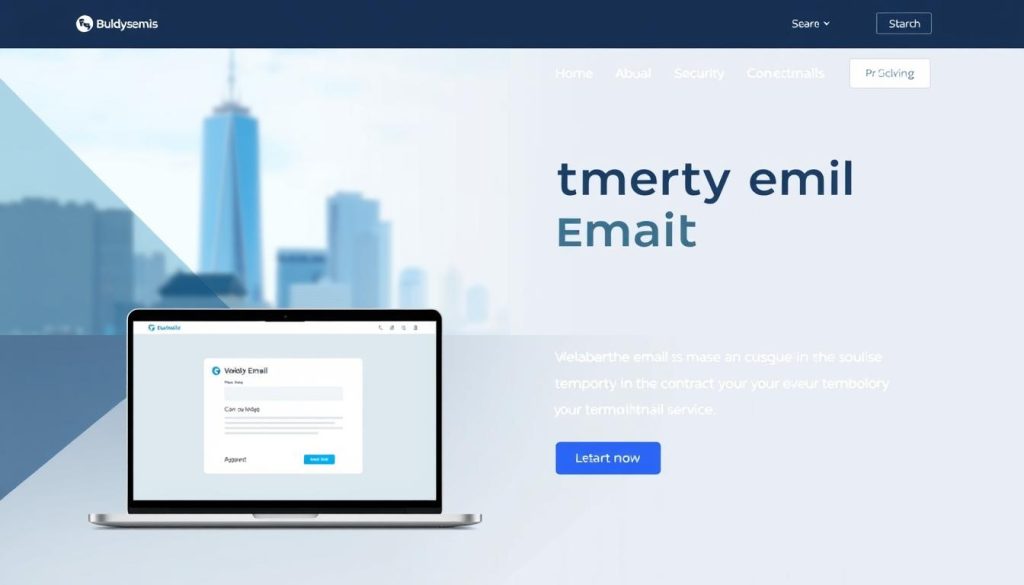Email is very important in our online world. Now, we have temporary email services. People wonder if they should use a disposable email or a regular one.
Choosing between temporary and permanent email solutions depends on why you need an email. For example, a temporary email is good for signing up for services or newsletters. It helps keep your main email safe from spam.
But, for talking to friends or work, a real email is better. It’s more reliable and safe.
Key Takeaways
- Temporary email services offer a convenient way to avoid spam.
- Real email accounts provide reliability and security features.
- The choice between temporary and real email depends on the context.
- Permanent email solutions are suitable for personal and professional use.
- Disposable emails are ideal for short-term purposes.
Understanding Temporary Email Services
Temporary email services help manage unwanted emails. They give users disposable email addresses for a short time. This reduces spam and keeps personal info safe.

What Is a Temporary Email?
A temporary email is a short-lived email address. It’s used to block spam from your main inbox. You might use it when signing up for services or buying online.
More people use temporary emails to keep their inbox clean. It helps keep your online life private.
How Temporary Email Services Work
These services create random email addresses for you. They last from a few minutes to days. When you get an email, it goes to the service’s servers.
You can check your emails online. When the address expires, it and all emails are deleted.
Popular Temporary Email Providers
Many services are popular for their ease and effectiveness. Some top ones are:
- GuerrillaMail
- Temp-Mail.org
- 10minutemail
These services make it easy to manage temporary emails. They meet different user needs.
The Role of Traditional Email Accounts
Traditional email accounts are more than just for sending messages. They are key to our online identity and safety. In today’s world, having a traditional email is like having a digital home base.
Features of Standard Email Services
Standard email services have many features that make them safe and easy to use. Some important ones are:
- Enhanced Security Measures: Many email providers have strong security like two-factor authentication and encryption.
- Generous Storage Capacity: They offer lots of space for emails, so you can keep many messages.
- Reliable Customer Support: You get help from dedicated teams to fix any problems quickly.
Types of Permanent Email Providers
There are different kinds of permanent email providers. They serve different needs and people. Here are a few:
- Consumer-focused Providers: Gmail and Outlook.com are for personal use. They give free email with lots of features.
- Professional and Business-oriented Providers: G Suite and Microsoft 365 are for work. They offer extra security and custom domain names.
Email as Digital Identity
In today’s world, an email is part of who you are online. It’s used for logging in, getting important messages, and even proving who you are. So, picking a secure and professional email is very important.

Keeping your email secure and your online privacy safe is very important. Be careful with what you share in emails. Also, update your security settings often to keep your account safe.
Temp Mail vs Real Email: When Should You Use Each?
In today’s world, it’s key to know when to pick temporary email or real email. Both have their good points and not-so-good points.
Key Differences at a Glance
The main differences are in purpose, how they work, and how long they last. Temporary emails are for quick use, like to skip sign-ups or dodge spam.
Real email accounts are for keeping in touch over time. They give you a steady identity for work or personal stuff.
“The key to effective email management is understanding when to use each type of email service.”
Comparative Analysis of Features
A comparison of temporary and real email shows their ups and downs. Here’s a quick look at these differences:
| Feature | Temporary Email | Real Email |
|---|---|---|
| Purpose | Short-term use, avoiding spam | Long-term use, personal/professional identity |
| Longevity | Self-destructs after a short period | Persistent unless deleted by user |
| Security | Less secure, prone to abuse | More secure, with recovery options |
Temporary emails are great for quick, throwaway emails. Real emails are best for keeping in touch over time.
Knowing these differences helps you choose the right email for different needs.
Benefits of Using Temporary Email Addresses
Temporary email services give users a safe and flexible way to be online. They help keep your main email private. This is very important today, when keeping your online life safe is key.
Privacy Advantages
Using temporary emails boosts your privacy. You can sign up for things without sharing your real email. This keeps your inbox safe from spam and hackers.
Key privacy advantages include:
- Protection against data breaches
- Reduced risk of identity theft
- Minimized exposure to spam
Spam Prevention
Temporary emails stop spam from reaching your main inbox. You can sign up for things without messing up your main email. This keeps your inbox tidy.
Account Creation Without Commitment
Temporary emails let you make accounts without being tied down. This is great for trying out services or getting access to content. You don’t have to worry about keeping an account forever.
Reducing Digital Footprint
Temporary emails help you leave a smaller digital mark. By not linking too many accounts to your main email, you stay less visible online. This makes your online presence smaller.
| Benefit | Description |
|---|---|
| Privacy Advantages | Protects personal email from spam and data breaches |
| Spam Prevention | Keeps primary inbox clean and organized |
| Account Creation Without Commitment | Allows for testing services without long-term email commitment |
| Reducing Digital Footprint | Minimizes online presence by limiting accounts associated with primary email |
Scenarios Where Temp Mail Excels
Temp mail is great in many situations. It gives you a safe and easy way to deal with emails online. You get a temporary email address that you can use for a little while.
Online Shopping and Free Trials
Using a temporary email for online shopping or free trials keeps spam away. For example, Amazon and Netflix need your email to start free trials.
Forum Registrations and Downloads
Temporary emails are handy for forums or software downloads. They help keep your main email box clean from spam.
Testing Services
Developers and testers use them to test emails without messing up their main inbox.
Protecting Your Primary Inbox
Using a temporary email for spammy services keeps your main inbox safe from junk emails.
| Scenario | Temporary Email | Real Email |
|---|---|---|
| Online Shopping | Reduces spam | May receive promotional emails |
| Forum Registrations | Avoids unwanted messages | May get spammed |
| Testing Services | Ideal for testing | Clutters the inbox |
In conclusion, temporary email services are very useful. They help in many areas, like shopping online or testing services. They offer safety and convenience.
When to Stick with Real Email Accounts
Temporary emails are great, but sometimes, a real email is better. Real emails last longer and are needed for some online things.
Professional Communications
At work, a real email is key. It’s how you talk formally and is needed for work emails.
Professional email accounts show who you are. They are seen as serious.
Important Services and Accounts
For safe services like banks, use a real email. They send important messages.
Having a real email means you get these messages. It’s important for keeping things safe.
Long-term Relationships with Websites
For sites you’ll use for a long time, a real email is good. This is true for subscriptions or forums.
Being active online means you need a real email. It helps you stay connected.
When Recovery Options Are Needed
For getting back into your online accounts, a real email is best. Many services use email for this.
With a temporary email, you might lose access. Real emails help you keep your accounts safe.
Security Implications of Both Email Types
Using temporary versus real email accounts has many security issues. It’s important to know these risks to keep our online selves safe.
Privacy Risks of Permanent Emails
Permanent emails are handy for keeping in touch over time. But, they also have big privacy problems. Emails sent to these addresses can stay forever, which might share our private info.
Data breaches are a big worry too. Hackers often go after permanent emails because they have lots of personal info. The more you use a permanent email, the bigger your digital trail gets.
Limitations and Risks of Temporary Emails
Temporary emails have their own set of security ups and downs. They’re less likely to be hacked because they’re used briefly and don’t hold much personal info. But, temporary emails can be used for bad things like spamming or making fake accounts.
Also, because they’re short-lived, we might lose important messages. And, if the service gets hacked, it could be a problem, though it’s rare.
Legal Considerations
Both types of emails face legal rules, mainly about keeping data private. For example, email services must follow laws like GDPR when they handle our emails.
Even though temporary emails might seem like a way to dodge laws, they’re still bound by the email provider’s rules. Knowing these legal details is key for everyone.
Best Practices for Managing Your Email Strategy
Temporary email services are getting more popular. It’s important to know how to manage your email well. A good email strategy helps keep your online life safe and private.
Using a multi-email system is a smart move. You can have different emails for personal and work stuff. And a temporary email for things you don’t want to keep.
Creating a Multi-Email System
Setting up a multi-email system takes some thought. First, think about what you do online and what email to use for each thing. For example, use a real email for bank stuff and a disposable email address for free trials.
Using email aliases or plus addressing is also good. It lets you have many emails that all go to one inbox. This makes managing emails easier.
Tools for Better Email Management
There are tools to help you manage your email better. Email clients with filters and sorters help keep your inbox tidy. Services for temporary email services are great for keeping your main email safe.
Don’t forget about password managers. They help keep your email passwords safe and strong. This makes your email system more secure.
Balancing Convenience and Privacy
It’s key to find a balance between easy email use and keeping your info private. Using many emails can help privacy but can also be hard to manage. So, pick a system that works for you and stick with it.
Check your email accounts often and change your strategy if needed. Think about the pros and cons of temporary email services. They’re easy but might not be safe if you lose access.
By following these tips and staying up-to-date, you can keep your online identity safe. And make your online life easier.
Conclusion
Choosing between temporary email services and real email accounts depends on your needs. Services like GuerrillaMail and Temp-Mail.org are great for privacy and avoiding spam. They’re good for online services you don’t fully trust or when you don’t want a long-term email.
But, traditional email accounts are key for work emails and important services. Gmail and Outlook have strong security and are reliable. They can’t be beat by temporary email services.
Having both temporary and permanent email accounts is the best strategy. Knowing the good and bad of each helps you decide when to use them. This way, you keep your online world safe and stay productive.
FAQ
What is the main difference between a temporary email and a real email?
Temporary emails are short-lived and used for quick tasks. Real emails last longer and are for ongoing talks.
Are temporary email services safe to use?
Temporary emails can be safe if you pick a good service. But, they might not be as secure as regular emails. There’s a chance your data could be exposed.
Can I use a temporary email for online shopping?
Yes, you can use them for shopping online. They’re good for keeping your main inbox clean. Or when you’re not sure about a site’s privacy.
How do temporary email services protect my online privacy?
They keep your privacy by giving you an email that’s not tied to you. This lowers the chance of your info being shared or sold.
Can I receive emails from any sender with a temporary email address?
Most services let you get emails from anyone. But, some block spammers or emails that look fishy.
What are the benefits of using a real email account for professional communications?
Real emails are professional and good for long talks. They’re also needed for security and to prove who you are.
Are there any legal considerations when using temporary email services?
Yes, there are legal things to think about. Using them to avoid laws or bills is wrong. Also, your area’s data laws might apply to these services.
How can I effectively manage both temporary and real email accounts?
Use a system with both types of emails. Tools can help manage them. Know when to use each for privacy and ease.
Can temporary email services prevent spam?
Yes, they help stop spam. Since they’re short-lived, they keep your main inbox clean.
When should I use a real email account instead of a temporary one?
Use a real email for work, important sites, and long-term talks. Also, when you need to recover your account.



